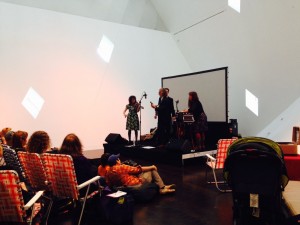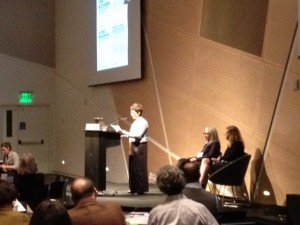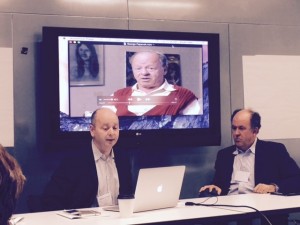Creating 21st Century Jewish Experiences: A Look Back at the 2015 Council of American Jewish Museums Annual Conference
April 9th, 2015
From March 8 – 10, 2015, The Contemporary Jewish Museum (The CJM) was delighted to host the 2015 Council of American Jewish Museums (CAJM) Annual Conference. Over 250 delegates convened at The CJM, as well as the Magnes Collection of Jewish Art and Life at UC Berkeley, for animated discussions revolving around the conference’s theme: “Open Source: Jewish Museums and Collaborative Culture.” Inspired by the Bay Area’s status as a national symbol and a harbinger of the future, the conference explored how California’s experiments in the social, cultural, political, and economic realms can inform Jewish museum practices.

CAJM participants enjoying a performance by “The Crooked Jades,” and the activated Hardly Strictly Warren Hellman exhibition
Even before the conference began, building community was a focal point. I was so touched by the opportunity, made possible by the generous support of the Jim Joseph Foundation, to host a special dinner at my home for the early-arriving attendees, preceded by a special Havdallah ceremony and architecture tour of San Francisco’s Temple Emanu-El. It was a wonderful way to introduce the CAJM participants to our local Jewish community.
The first day of CAJM included the conference’s plenary session, which I was thrilled to moderate. “The Anticipatory Museum” keynote address explored the question of how Jewish museums must change to anticipate societal transformations—demographic, technological, and cultural. Skyping in from Warsaw was NYU Jewish historian and cultural scholar, Barbara Kirshenblatt-Gimblett. She spoke about the new POLIN Museum of the History of Polish Jews in Warsaw, and how it acts as an agent of social change in the country by reconnecting Jews of Polish ancestry with more than 1,000 years of their history in Poland and, in turn, introducing the Polish people as a whole to their country’s and culture’s deep interconnectedness with Jews.

Rabbi Noa Cushner speaking about her spiritual “start-up,” The Kitchen, during the March 8 plenary session
Rabbi Noa Kushner, founder of San Francisco’s The Kitchen, shared her experience creating a spiritual start-up and practicing “irreverent reverence”—the creation of a community where there are no insiders or outsiders and where the primary concern is that Jewish practices be relevant. She encouraged Jewish museums to recognize the diversity of points of view of their visitors and meet them where they are—Jewish, non-Jewish, agnostic, atheistic, believing. Along with this approach she also urged museums to de-emphasize offering opportunities for visitors to consume “Jewish culture” and instead help visitors participate in the act of “doing something Jewish.”
Hillary Moss, lead strategist and researcher for the La Placa/Cohen-New York Times study Culture Track 2014, rounded out the conversation by sharing key findings about millennials and their museum-going habits and desires. She cited several trends that CAJM attendees would be wise to note, including that younger people don’t feel the same loyalty to cultural institutions as older generations did, and they tend to see the museum-going experience as an intensely social activity to be done (or shared digitally) with friends. Ms. Moss’ call to action was for Jewish museums to recognize this as a transitional moment and boldly experiment with new ways of engaging with younger audiences through social media and social interaction.
Among other highlights of the conference was the final session on philanthropic trends entitled “Measuring Impact: New Directions in Philanthropy.” Lucy Bernholz, Visiting Scholar at Stanford’s Center on Philanthropy and Civil Society, spoke to the intrinsic need for good measurements of philanthropic impact in the digital age—pointing to not only quantitative metrics, but also to the tremendous value of the qualitative, the affective, and learning outcomes. Chip Edelsberg, Executive Director of the Jim Joseph Foundation, discussed the acceleration of change in the digital era, and how public measures of philanthropy are in flux. He also discussed the rise of investment-style philanthropy, where mission alignment between the funder and the fundee is key, and mutually agreed upon outcomes are monitored, reported, and amended as organizations and circumstances evolve. He stressed trust as a critical pre-requisite for a healthy relationship between funders and fundees, along with a shared commitment to success, and open and ongoing communication.

Stephen Smith and Michael Abramowitz, presenters during the March 10 session, “The Future of Holocaust Education”
In hosting CAJM’s 2015 Annual Conference, The CJM was intentional about grounding the conference in the daily activities of The Museum. Most conferences take place in hotels or conference centers, but this one took place when The CJM was at the height of its public programming. In addition to hearing from thought-leaders and engaging with colleagues, CAJM attendees could explore multiple exhibitions, attend gallery tours, view the new Lamp of the Covenant installation in The CJM’s Koret Taube Grand Lobby, attend education programs for preschool students and their families, and hear a live performance by local artists “The Crooked Jades.” In doing so, CAJM participants were immersed in the real work of The CJM—giving them a first-hand look at how The Museum is advancing our mission to make the diversity of the Jewish experience relevant for a 21st century audience.
Lori Starr is the Executive Director of The Contemporary Jewish Museum, San Francisco. She previously served as Executive Director of the Koffler Centre of the Arts, Toronto, and as Senior Vice President and Museum Director of the Skirball Cultural Center in Los Angeles.